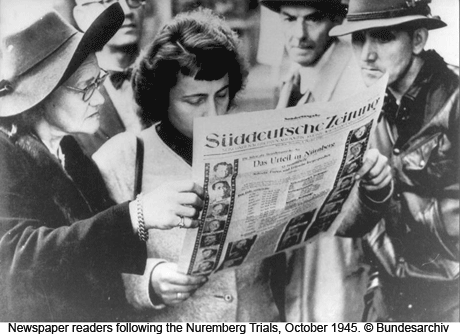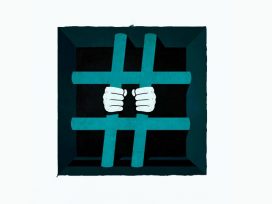Yes, newspapers are relevant – and I can prove it. They are more relevant than Hypo Real Estate, more relevant than Deutsche Bank or Dresdner Bank. They are far more relevant than Opel or Arcandor. The Süddeutsche Zeitung is relevant, the Frankfurter Allgemeine is relevant; Der Spiegel, Die Zeit, Die Welt, the Frankfurter Rundschau and the tageszeitung are all relevant. So are many others. The system in which they are relevant is not called the market economy, not the financial system or capitalism, but democracy. Democracy is about a community shaping its future together. And the media, in all its forms – print, broadcast and digital – is one of its most important creative forces. The proof of the relevance of the press is 177 years old, begins in 1832 and continues right up to the present day. It arises out of the entire history of German democracy.
This history of German democracy begins in 1832 at the castle of Hambach, at the first ever mass demonstration in Germany. Its chief organizer was our journalistic forebear Philipp Jakob Siebenpfeiffer, born in 1789, the year of revolution. When the government sealed up its printing presses, he took it to court on the grounds that the sealing of printing presses was as unconstitutional as the sealing of baking ovens. This is a marvellous phrase, because it contains within it the recognition that the freedom of the press is democracy’s daily bread. Press freedom is the daily bread of democracy: that is the message of Hambach Castle in 1832.
Hambach was then, in the very first days of German democracy, the very earth in which the trees of liberty were planted. Today these trees of liberty are deeply rooted, they are fully grown and they are tended by the Federal Constitutional Court in Karlsruhe. Karlsruhe is something like the Hambach of our age; and Karlsruhe has confirmed the constitutional relevance of the press in major judgements, for instance in the Spiegel judgement of 1965, or the Cicero judgement of 2007. “A free press that is not influenced by the public use of force and is not subject to censorship is a fundamental component of a free state.” Furthermore, “the press is a body whose permanent function it is to mediate between the people and its elected representatives in parliament and government and to monitor them”. That may not be as vividly expressed as at Hambach Castle, but it means the same thing: freedom of the press is democracy’s daily bread.
Public radio and television, which are “the press” in the legal sense, also of course provide this “daily bread” – and are well rewarded for doing so. The acknowledgement of the constitutional relevance of public radio and television is in the broadcasting licence fees. Compared to what ARD, ZDF, Deutschlandfunk and co. put together have received in licence fees, the stimulus package for the economy for the year 2008-9 is a mere pittance, and the sums provided by the state for the Hypo Real Estate bank are practically a personal loan. But in return for this money, public broadcasters provide not only our daily bread, but all kinds of cakes and pastries too.

State-financed newspapers?
You probably think that my comments on the relevance of the print media have been leading up to a plea for its financing or support by the state. Far from it, in fact. I don’t want to see any demonstration of goodwill for the press or any state security, relief package or emergency money. The last thing newspapers need is a situation similar to ZDF – when political parties think that they can not only choose the chief editor of the public news channel, but also the editor of the tageszeitung. Above all, the reason why I don’t want any state loan, rescue package or emergency money for newspapers is that I just don’t see the desperate state of newspapers such as it is being universally bemoaned. Rather I see a remarkable kind of journalistic decadence; melancholy mixed with an easy-come, easy-go attitude, world-weariness and supposed helplessness in the face of dwindling sponsorship and the Internet, in the face of the current state of affairs and their apparently inexorable trend. This alleged state of existential crisis, the very moribundity of newspapers or even of professional journalism in general – all this is a manifestation of the kind of hysteria that thrives in journalism more than it does elsewhere. This cock-a-doodle-doo journalism, this excitable squawking which has shaped our political journalism for some time, is now squawking its own end into being. We are writing our very own fin de siècle. We are running down our own product, denigrating it until everyone believes it – even intelligent people like Jürgen Habermas and Dieter Grimm.
The philosopher Jürgen Habermas and the former federal constitutional judge responsible for press freedom, Dieter Grimm, have argued for newspapers to be funded by the state. They believed and believe in the existential crisis of newspapers – and their response is an almost desperate declaration of love. We journalists for the most part dismissed this rather arrogantly, often because it is easier to dismiss such an argument than to complain about the lack of imagination on the part of one’s own publishers and management, and to denounce the unrealistic profit expectations of one’s owners. Excessive profit demands on the part of newspaper owners are an expression not of financial need, but of short-sightedness and stupidity.
After all, it is simply not the case that newspapers in Germany are in the red; it is not as if they have been making a loss for years. They are just not making as great a profit as they were. This happens in the very best businesses, including those to which we have no fundamental right. Publishing companies use this alleged state of emergency as a kind of exaggerated self-defence. Many of the so-called reconstruction measures and the waves of redundancies in German media houses are supposed self-defence mechanisms that have been taken to extremes, which – and this is the really tragic thing – endanger the very basis for the future prosperity of press enterprises.
German newspapers do not need any money from the state. But they do need journalists and publishers to do their work properly. They need journalists of integrity who are inquisitive, discerning, uncomfortable and self-critical. They need owners who value such journalism – who want more from their newspapers than money, who are proud to be newspaper owners; and whose pride means more to them than one or two per cent more profit.
The newspaper depression in the United States
Journalism in Germany has delighted in letting itself be swept up in the American newspaper depression. We behave as if it is simply a given that the “state of play” in the US matches the state of affairs in Germany. We see newspapers supposedly dying out in America and simultaneously overlook the fact that a remarkable 50 per cent of all adult Americans open a newspaper daily. Be that as it may, the crisis in America does exist. Long before the global financial crisis came to a head in the autumn of 2008, 19 of the 50 biggest US papers were in the red. If there is one branch of the economy in the USA that is worse off today than the banks, it is daily newspapers. Stephan Russ-Mohl, professor of journalism in Lugano, explains what media enterprises have in common with the financial jugglers of Wall Street: “It wasn’t so long ago that the one branch of the economy that gave a better return on investments [than banks and newspapers] was casinos.”
Banks, newspapers, casinos. That should give us a clue as to what led to the American newspaper depression: above all, greed. The American newspaper industry has fallen victim to the Wall Street theory that dictates that the way to maximize profit is to minimize your product.
Newspapers in the United States went to the stock market and, in return for their efforts, were brought to the brink of financial ruin. Their value became dependent not on their readers, but on their shareholders. Newspapers were expected everywhere and at all times to improve their value on the stock market. This is why such ruthless restructuring took place, why networks of correspondents were cut, offices closed and editorial departments emasculated, with printing costs reduced at the expense of content. Investment funds have taken on a fundamental economic interest in more and more newspapers. No one needs to point out that fund managers have no interest in the business of producing a newspaper: but this has been, and remains, a cause of the dreadful state of affairs in the US.
The other reason may have something to do with the fact that American papers completely failed to perform their function in the Bush era. In Washington, in the words of Pulitzer Prize-winner Russell Baker, “the capital’s renowned press corps were happy to be fobbed off with lies and to be made into the auxiliary troops of a clique of neoconservative conspirators”. As a result, blogs became nothing other than a democratic necessity, to replace what was missing. In blogs you found the critical analysis and commentary opposing Bush and the war in Iraq that you could not find in the newspapers. Good journalists should not start wailing and gnashing their teeth at the thought of the blogosphere. They should be grateful to bloggers for filling in, where needed, the commentary that they fail to provide and exposing their own mistakes.
There is much to be learned from the newspaper depression in America. Especially, what needs to be done to avoid such a depression. Some things are worth stating explicitly here: maybe, above all, that mawkishness needs to be replaced by passion. Impassioned journalism would not accept the manipulation of the press by the Deutsche Bahn so readily as has recently happened. Instead, there would be an outcry. Perhaps the truth is that we are embarrassed, firstly to have allowed ourselves to have been manipulated like this, and secondly because these things were exposed not by the press, but by the private organization “Lobby Control”.
Blogs = more democracy
As far as blogs and the Internet are concerned, I do not understand why, as print journalists, we should be afraid of the Huffington Post. It does the same thing as a quality German newspaper does: “proper” journalism. We should stop constructing artificial antitheses between newspapers and classical journalism on the one hand, and blogs with their supposedly “unclassical” journalism on the other. We should stop regarding blogs with financial envy. There is much less money made in blogging, and with blogs, than with newspapers. We should stop the vapid talk of how classical journalism is disappearing into a “Bermuda Triangle”. Good classical journalism is no different from good online journalism. The baselines run right across all these frameworks and clusters: there is good journalism and bad in all media. It’s as simple as that.
Good journalism has good, no, great times ahead. Journalists have never had a bigger audience than in the aftermath of the digital revolution. Journalism was never accessible across the world before as it is now. And there was probably never so much demand for journalism that enlightens and classifies, which one can rely upon and look to for orientation. But the fact remains that the broadening of knowable knowledge via the web (the philosopher Martin Bauer calls it the “horizontal” broadening of knowledge) is achieved at the cost of the deepening of that knowledge (thus, in Bauer’s terminology, its verticalization). In brief: the quantity of data increases, but without being processed. This presents journalists with a new task: the only remedy against data trash is thoughtful reflection and background knowledge. Print journalism therefore needs to react to the media revolution by inventing new “formats”, with journalists taking on the task of sorting the wheat from the chaff. The new formats are where the web’s mass of data is sorted and evaluated.
The amateur journalism thriving in the blogosphere is no reason for professional grumbling. This amateur journalism affords opportunities for fruitful collaboration. It represents a democratic profit. These bloggers remind me of the revolutionary citizens of 1848-49, and the communications revolution of today reminds me of the one of 150 years ago.
For the revolution of 1848-49 was also a communications revolution. The number of daily newspapers in German practically doubled, from 940 in 1847 to 1700 two years later. In Paris the total circulation of all papers soared from 50 000 before the revolution to 400 000 in May 1848, when 171 newspapers could be counted in the French capital. One of the chief activities of the incredible number of political organizations that were founded at the time was to read aloud from newspapers and discuss the material together. The explosive spread of the press, together with the new means of transportation offered by the railways, gave rise to a new and greater sphere of experience. In Germany, the intellectual idea of a shared German fatherland thus became a tangible reality. In short: 1848, the year of revolutions, stands for a political learning process that included hundreds of thousands of people and gave them the opportunity to participate in the political process. 150 years later, the digital revolution offers the same possibility once again, on an unheard-of scale.
Put a different way: blogs are “more democracy”, even with all the imponderables they entail. Inherent in blogs is the opportunity for a new civil revolution. Should professional journalism really turn up its nose at this, just as the established princely rulers and monarchical potentates did 150 years ago?
Talk less, act more
Maybe in Germany we should stop talking about freedom of the press so much and actually practise it instead. Too much incense, it is said, spoils the saint. And what is true of saints could also be applied to fundamental rights: amid their ritual exaltation they become scarcely recognizable and lose their identity. Be that as it may, the law views freedom of the press as a basic right worth making a fuss about. It is almost like one of those pieces of glittering tinsel that we put up on special days such as the anniversary of the federal constitution – just as a German family does with the Christmas decorations on 24 December. After the festive season, we put all the stuff away.
In the day-to-day legislative routine, the freedom of the press plays no role at all: take the BKA law, the mass storing of private data, the laws on telecommunications surveillance. Journalists’ telephones are bugged, phone numbers are stored, journalists’ computers can be searched – as if there were no such thing as the protection of confidentiality and no such thing as press secrecy. What is the use of the right of a witness to refuse evidence, as guaranteed in the code of criminal procedure, or journalists’ right to the confidentiality of sources, if the state can find all that out by searching through computers or recording phone conversations without court authorization?
As has sadly been the case for some time, press freedom is compelled to stand aside when the state comes along with its blue light flashing, in other words by claiming that security interests are at stake. Lawmakers have become accustomed to having little regard for press freedom. I wonder myself whether journalism has not itself got used to having a low opinion of itself. Does the press pose a greater danger to press freedom than the legislature? I believe so. The truly great danger for journalism in this country comes from within, from the media themselves – from a journalism that despises journalism, from owners and publishers who bring journalism to its knees through economizing measures, real or pretended, and from media entrepreneurs who lay journalism upon the altar of the commercial and advertising market.
Perhaps it is my origins in Regensburg that at this point bring to my mind something that the late Prince of Thurn und Taxis once said. Speaking of the princely fortune, he described it as something so vast that it could never be drunk, eaten or whored away – all one could do was stultify it. Sometimes I get the feeling that this is also true for the intellectual and economic assets of the big German newspapers.
The journalism of the future
What will journalism look like in the future? Anyone who wants to talk about the future has to know about the past. I began by mentioning our ancestor Philipp Jakob Siebenpfeiffer, because he stands at the beginning of a line of great journalists. The Siebenpfeiffers of the Weimar Republic were called Kurt Tucholsky and Carl von Ossietzsky, in the Federal Republic they were called Henri Nannen and Rudolf Augstein, and even Axel Springer. Even with all their differences and contrasts, they were aware that journalism has a task that goes beyond making money.
I often speak of these great names of journalism, because they stand not only for journalism’s past, but also its future. It is important that our young colleagues in schools of journalism not only learn how “crossover journalism” works, that they not only learn how to write, and produce, quickly and effectively, but also that they learn to appreciate that there are journalistic exemplars to emulate, great ones at that – why they are great, and how they became so. Why? Not only because they were wonderful journalistic craftsmen and intelligent and astute publishers, but because they had a certain attitude.
Attitude: the word has gone out of fashion. It means standing up for what you believe in, not bending in the face of short-lived trends, of unrealistic profit expectations, or balance sheets. I am convinced that if the journalistic side of a newspaper or a media enterprise is healthy, then in the long term the economic side will be healthy too. Today, an appropriate journalistic attitude includes considering, in cooperation with others, how “creative” savings can be made. In other words, we have to be clear about what the press needs in order to defend its freedom from the cuts being made in the news and media markets.
Perhaps we should talk less about press freedom and practise it more. That goes for publishers and editors. Both publishers and editors must show in their work – and not in cheap petitions made to legislators – what freedom of the press is and what it means to them. What is worse than raids on Cicero offices, worse than the stockpiling of data and police searches of online material, are mental straitjackets self-imposed by journalists, and the self-emasculating measures being carried out by publishers in editorial offices. Press freedom is not the freedom to squeeze editorial offices dry. Nor is it the freedom to replace oneself by part-time offices, as if it were a case of keeping a call centre operational for a while. Press freedom is not the freedom of corporate raiders, but rather the freedom of responsible journalists and publishers. These asset-strippers devour everything, even freedom of the press. Sometimes they even disguise themselves as benevolent philanthropists. The work of journalists cannot simply be farmed out to lobby-financed advertising agencies and freelance writing services. Yet that is what is happening. We are facing the acute danger, for the first time since 1945, of German journalism becoming trivialized and reduced to the lowest common denominator because of the increasing pressure to make a profit; and because informed, capable journalists not in the pocket of private interests are increasingly being replaced by multimedia production assistants, razor-sharp jacks-of-all-trade and masters of none. The profession known today as journalist will then become a multi-functional filler of newspapers and websites. Such filling skill is not exactly the democratic cultural institution which the fundamental right of the freedom of the press was established to protect.
Freedom is something guaranteed the press – that is to say, journalists, publishers, media enterprises. Press freedom could cease to apply if this privilege is misunderstood as freedom without responsibility – and if media enterprises see themselves merely as profit-making concerns like any other. Managers are mistaken if they believe that the manufacture of print publications is no different from the manufacture of clingfilm. There is no fundamental right set down in law for manufacturers of clingfilm. There is a reason, however, for the press’s fundamental right to freedom: it is the precondition for a functioning democracy. If this basic principle is not respected any more, this fundamental right loses its raison d’être. And in that event, newspapers really will be robbed of a future. More and more people are already busy writing the newspaper’s obituary: “Born 1603 in Strasbourg, Alsace, died 2020. We shall honour the newspaper with a fitting memorial.” These funeral orators are not talking about the merging of editorial offices, nor about editors who have lost their jobs, nor of outsourcing – rather it is the Internet they are thinking of. Ever since the American journalist Philip Meyer published a book in 2004 called The Vanishing Newspaper, panel discussions about the Internet at media conferences have sounded like preparations for the funeral of the newspaper.
For a start, such thoughts are a little premature, given that Professor Meyer only forecast the year 2043 for the death of the daily newspaper. Secondly, Meyer’s prophecies could end up like those of his colleague Francis Fukuyama, who proclaimed the “End of History” in 1992, after the collapse of the Eastern Bloc and the communist states. History then refused to obey.
But this desire to accelerate the death of the newspaper, the mortality diagnosed by Meyer, does indeed exist. Recently in Germany it was David Montgomery who sought to drive journalism out of the Berliner Zeitung and make the paper into a kind of user interface featuring less and less of anything that costs money (i.e. good articles) and more and more of what brings money in (i.e. advertising and product placement). As I have discussed, this is a pattern we are already familiar with from the USA, where journalists are made redundant, correspondent numbers are reduced, editorial offices broken up and articles written in-house replaced by agency-written pieces or bought in on the cheap. The editor-in-chief becomes a head of management; intellect is replaced by inanity; and savings are made until readers leave. It is like a twisted version of the Rumpelstiltskin fairy tale; gold, out of greed and folly, is spun into straw. In the case of the Berliner Zeitung, we may hope that the paper has now taken a turn for the better. But I worry that though Montgomery may now be gone, his example has become the accepted thing.
Only reflection and background education can help us to combat “data trash”
This is not what a successful future for the newspaper would look like. The daily paper must change itself, and it will – far more than competition from radio and television have changed it. The contents of newspapers will be different from what we have grown accustomed to, but it will remain newspaper journalism, very much so. The texts will have to be news in the original sense – texts around which we can orient ourselves. There will also have to be texts and formats which sort, order and evaluate the mass of information in the Internet. This will come at a cost. But I believe that many newspaper readers will be willing to make a contribution, and that there will be users who will be drawn to newspapers for this very reason.
As I have stated, only reflection and background knowledge can help us to combat “data trash”. This is what newspapers must provide. But this cannot be achieved with the kind of journalism that is gradually dumbing itself down. Journalism done on the cheap is destined for the trash, not to be read. If a newspaper bases itself around advertisements, it becomes no longer a newspaper at all, but a freesheet, which does not even have enough adverts to finance itself any more.
If journalism is not to become a cheapened caricature of itself, what cannot be allowed to continue much longer is newspapers giving away their most important articles on the Internet for free. That is, quite literally, a form of self-betrayal. A very rapid change of course will have to take place, towards a very simple, straightforward and workable system of micro-payment-per-article. Then you would get the appetizer for free, while the main course would cost a few pence. Click and buy: it doesn’t kill anyone, but it does make newspapers stronger.
Having said that, I would have no objection to endowment foundations, which are currently experiencing a welcome upturn, offering newspapers a helping hand: they could certainly do with a little patronage. Sponsorship of a newspaper endowment is truly sponsorship of public welfare. The FAZ endowment model (for decades, the financial and editorial independence of the Frankfurter Allgemeine Zeitung has been supported by the FAZIT Foundation) ought to be able to entice people to emulate it. There is after all no shortage of intelligent and responsible multi-millionaires in Germany.
The Internet, the Internet! Many newspaper people talk about it as though it were a new invasion of the Huns. The Huns came from nowhere 1500 years ago and reduced everything to rubble (and then vanished again 100 years later). The Internet is not reducing anything to rubble. And this is precisely the lesson of every revolution in communication throughout history: no new medium has ever driven out the old ones. They learn to coexist. The Internet does not replace good editors, nor does it make good journalists irrelevant. On the contrary: it makes them even more important than before.
Furthermore, it will continue to be the case, more so than ever, that it is authors who lend authority, and that no pain, no gain in quality. This motto may be displayed in the Hamburg School of Journalism, but it does not apply only to students of journalism. It does not mean that readers and users should be tormented with stupid, superficial journalism. No pain, no gain in quality: this phrase demands of journalists in all media, even the Internet, that they give the maximum effort to achieve their best work. Then journalism will have a splendid future in store.
Let us return to this image of journalism at the dawn of a new age – the grey sky that represents the beginning of the transition from night to day. If we can locate journalism at this moment of transition, then we can be very happy. When the night is over, we have the chance to do something exciting with the day.
Based on a speech made at the annual meeting of netzwerk recherche e.V. in 2009







